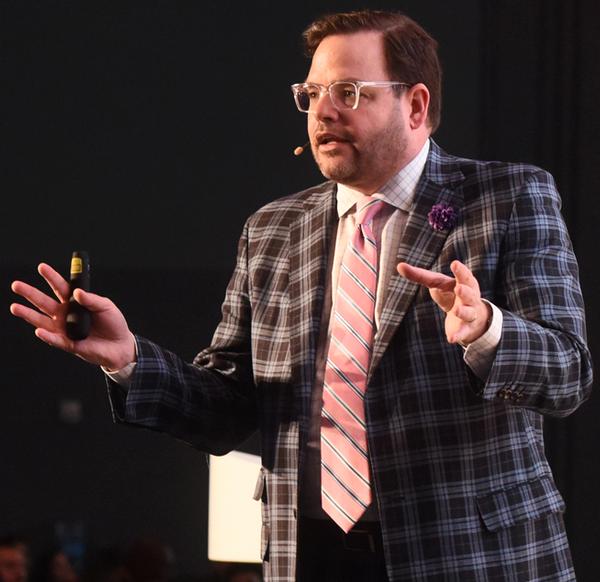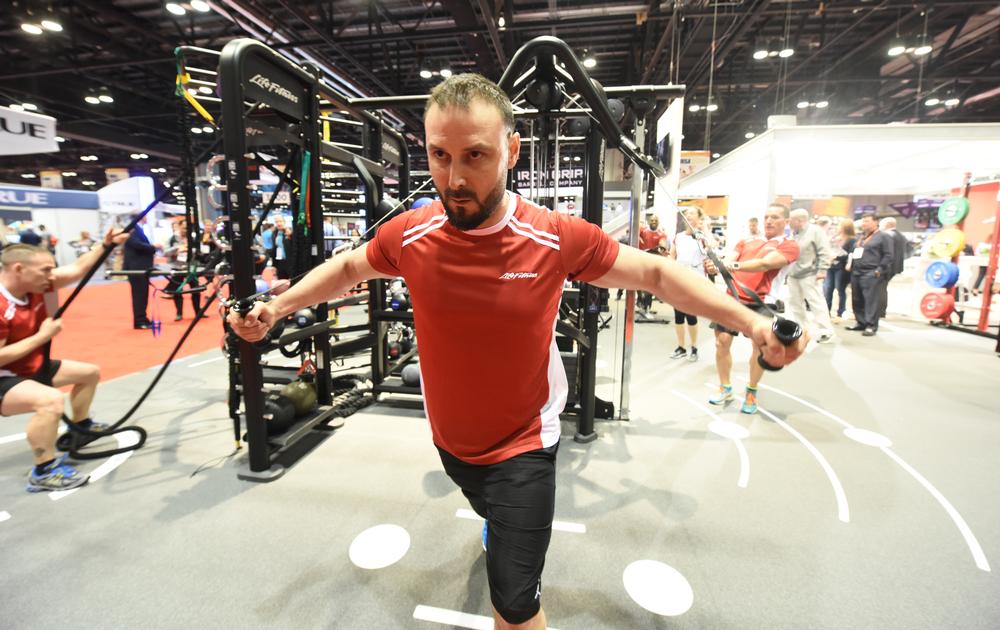IHRSA’s 35th Annual International Convention & Trade Show was held on 21–24 March in Orlando, Florida, US, attracting visitors from around the globe – approximately 6,500 attendees, representing 81 countries.
The event featured four highly engaging keynote speakers; a menu of 150 educational seminars, roundtables and networking events that were organised into 11 targeted themes; annual events, including the IHRSA Financial Panel and the Women’s Leadership Summit; special sessions such as the Global Leadership Summit; a variety of receptions and social events such as Augie’s BASH; and thousands of product demonstrations and in-depth conversations on a bustling 470,000sq ft trade show floor, which played host to 415 companies from around the world.
Finding triggers, facilitating breakthroughs
The first day of the convention featured keynote speaker Jay Baer, an author and founder of strategic consulting firm Convince & Convert. Baer charmed the audience with some self-deprecating remarks about his plaid suit and pink tie, but quickly got down to business. His central point: “When you market, stop trying to be amazing and clever. Just be useful. Give people help, not hype.”
Among his many suggestions: identify what your customers want and exceed their expectations. Do rewarding things that they don’t expect. And give them ‘talk triggers’ – things they’ll share with their friends and family.
The following day, Greg McKeown – author and CEO of management consulting firm THIS Inc – opened his keynote by quipping that his father had hoped he’d become a barrister in his native England. Apparently, McKeown’s choice of writing and consulting wasn’t Dear Old Dad’s idea of success.
“Why is it that otherwise successful people or companies often fail to break through to the next level?” asked McKeown, introducing the topic of his best-seller, Essentialism. The reason, he said, is “the undisciplined pursuit of more”.
In fact, he explained, success can become a catalyst for failure because it tends to give people too many options. “The solution – the antidote – is the disciplined pursuit of less, but better,” McKeown urged. “When you master that, you become an ‘essentialist’ – a person who concentrates on the essentials.
“Instead of trying to be everything to everyone, essentialists ask: ‘What’s the exact right thing for me?’ They explore more and commit less.”
Tapping social media, creating habits
On Wednesday, Randi Zuckerberg – author of Dot Complicated and founder and CEO of Zuckerberg Media, a boutique marketing and production firm – also elicited chuckles at the outset of her keynote address. She noted that, while she finished her degree at Harvard University, her now-famous younger brother, Mark – the co-founder, CEO and chair of Facebook – didn’t.
Zuckerberg also mentioned that she’d had doubts about working for what she called her brother’s “stupid company”, but eventually relented and went on to spend seven years with the firm.
One of the lessons offered by Facebook, which is now valued at US$200bn, is the importance of a creative culture, she observed. For instance, the company makes use of ‘hackathons’, during which staff are encouraged to pull all-nighters to develop pet projects that have nothing to do with their day jobs. “When you remove the fear of looking silly or stupid, you get people to generate their best ideas,” she said.
The final keynote speaker, on Thursday, was Nir Eyal – the author of business best-seller Hooked – who looked at the factors behind smartphones’ popularity, and what these can teach businesspeople about modern consumer behaviour.
Eyal identified and described the role that four key elements – triggers, action, reward and investment – play in forming a habit. The habitual use of a product or service, he explained to the audience, matters to the bottom line because it increases both a customer’s lifetime value and the company’s ability to raise prices, as well as boosting the product’s defensibility and making it harder for competitors to woo clients away. “By understanding the minds of our consumers, we really can design habits that improve peoples lives,” he said.

























































